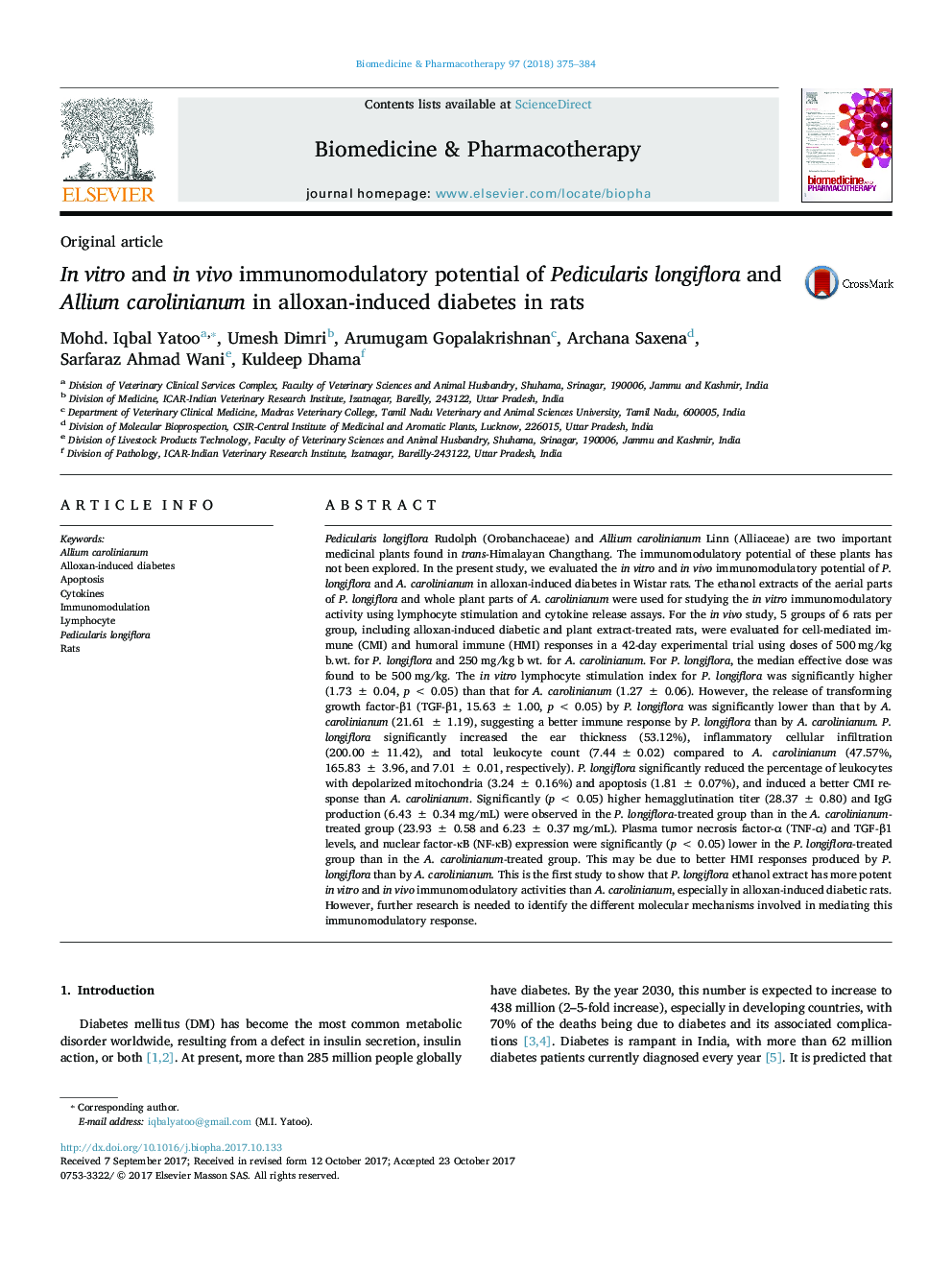| کد مقاله | کد نشریه | سال انتشار | مقاله انگلیسی | نسخه تمام متن |
|---|---|---|---|---|
| 8526351 | 1557945 | 2018 | 10 صفحه PDF | دانلود رایگان |
عنوان انگلیسی مقاله ISI
In vitro and in vivo immunomodulatory potential of Pedicularis longiflora and Allium carolinianum in alloxan-induced diabetes in rats
دانلود مقاله + سفارش ترجمه
دانلود مقاله ISI انگلیسی
رایگان برای ایرانیان
کلمات کلیدی
موضوعات مرتبط
علوم پزشکی و سلامت
پزشکی و دندانپزشکی
تومور شناسی
پیش نمایش صفحه اول مقاله

چکیده انگلیسی
Pedicularis longiflora Rudolph (Orobanchaceae) and Allium carolinianum Linn (Alliaceae) are two important medicinal plants found in trans-Himalayan Changthang. The immunomodulatory potential of these plants has not been explored. In the present study, we evaluated the in vitro and in vivo immunomodulatory potential of P. longiflora and A. carolinianum in alloxan-induced diabetes in Wistar rats. The ethanol extracts of the aerial parts of P. longiflora and whole plant parts of A. carolinianum were used for studying the in vitro immunomodulatory activity using lymphocyte stimulation and cytokine release assays. For the in vivo study, 5 groups of 6 rats per group, including alloxan-induced diabetic and plant extract-treated rats, were evaluated for cell-mediated immune (CMI) and humoral immune (HMI) responses in a 42-day experimental trial using doses of 500 mg/kg b.wt. for P. longiflora and 250 mg/kg b wt. for A. carolinianum. For P. longiflora, the median effective dose was found to be 500 mg/kg. The in vitro lymphocyte stimulation index for P. longiflora was significantly higher (1.73 ± 0.04, p < 0.05) than that for A. carolinianum (1.27 ± 0.06). However, the release of transforming growth factor-β1 (TGF-β1, 15.63 ± 1.00, p < 0.05) by P. longiflora was significantly lower than that by A. carolinianum (21.61 ± 1.19), suggesting a better immune response by P. longiflora than by A. carolinianum. P. longiflora significantly increased the ear thickness (53.12%), inflammatory cellular infiltration (200.00 ± 11.42), and total leukocyte count (7.44 ± 0.02) compared to A. carolinianum (47.57%, 165.83 ± 3.96, and 7.01 ± 0.01, respectively). P. longiflora significantly reduced the percentage of leukocytes with depolarized mitochondria (3.24 ± 0.16%) and apoptosis (1.81 ± 0.07%), and induced a better CMI response than A. carolinianum. Significantly (p < 0.05) higher hemagglutination titer (28.37 ± 0.80) and IgG production (6.43 ± 0.34 mg/mL) were observed in the P. longiflora-treated group than in the A. carolinianum-treated group (23.93 ± 0.58 and 6.23 ± 0.37 mg/mL). Plasma tumor necrosis factor-α (TNF-α) and TGF-β1 levels, and nuclear factor-κB (NF-κB) expression were significantly (p < 0.05) lower in the P. longiflora-treated group than in the A. carolinianum-treated group. This may be due to better HMI responses produced by P. longiflora than by A. carolinianum. This is the first study to show that P. longiflora ethanol extract has more potent in vitro and in vivo immunomodulatory activities than A. carolinianum, especially in alloxan-induced diabetic rats. However, further research is needed to identify the different molecular mechanisms involved in mediating this immunomodulatory response.
ناشر
Database: Elsevier - ScienceDirect (ساینس دایرکت)
Journal: Biomedicine & Pharmacotherapy - Volume 97, January 2018, Pages 375-384
Journal: Biomedicine & Pharmacotherapy - Volume 97, January 2018, Pages 375-384
نویسندگان
Mohd. Iqbal Yatoo, Umesh Dimri, Arumugam Gopalakrishnan, Archana Saxena, Sarfaraz Ahmad Wani, Kuldeep Dhama,